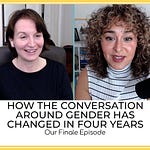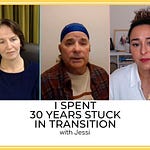Ellie was a gender nonconforming 90s kid in the UK. She became a patient of what came to be the Gender Identity Development Services (GIDS) at Tavistock. She was seen at the time by Dr. DiCeglie, a child and adolescent psychiatrist, and the GIDS founder. Ellie describes her psychological treatment with him and her decision, early on in life, that medicalization simply was not an option. She tells us about her family life and coming to terms with being gay in her teens. Ellie is now married to her wife and living happily. But she also talks about gender dysphoria being something she, and many lesbians, simply learn to live with. She offers some fascinating insights about the way technology is used, and social media, in particular, can mimic a kind of schizophrenia experience, with too many competing voices and opinions influencing the minds of teens today. She tells us about being featured in a BBC2 children’s program as a kid, and you can see the YouTube video of this segment in the show notes. We also discuss the book Hannah Barnes has written, soon to be published, for which Ellie was interviewed. If you’ve ever wondered about the desistance literature and hoped to tie a more human, personal story to the statistics, then you’re going to appreciate this discussion with Ellie.
Links:
BBC2 Short Film: https://www.youtube.com/watch?v=zRU8TtOqGSA
Extended Notes
From as early as two years old, Ellie rejected dress clothes.
Ellie has a theory that her sister’s ability to get attention played a part in her gender dysphoria.
Ellie thought life would be easier if she was a boy and only hung out with boys.
Why does being a boy or a girl matter?
Ellie’s mother was a nurse who was treated for a genital condition (DSD) when she was born.
Ellie’s mother took her to GIDS at Tavistock to treat her gender dysphoria.
DSD is caused by a recessive gene.
Ellie’s parents were freely naked in the house and on vacation at nudist beaches.
When approached with the idea, Ellie thought of medicalization and surgery as a ridiculous option.
Ellie was treated by the doctor who founded GIDS at Tavistock.
Some doctors are in the business for status.
Entering puberty Ellie did have one influential female friend.
Ellie’s doctor provided a Watchful Waiting period.
Buffy the Vampire Slayer offered Ellie a glimpse into the idea that women could be superheroes and embody their power.
Everyone naturally has a relationship with their gender.
The thing, Ellie says, she desired from masculinity is to have height. Surgery couldn’t provide that.
Gender dysphoria is not static. It is constantly changing.
Ellie had unrequited crushes on straight girls but her first sexual encounters were with men because that is who approached her.
Romantically Ellie is interested in women, physically she considers herself bisexual.
Ellie considers social media to be a drug.
Ellie was interviewed extensively for Hannah Brown’s upcoming book about the Tavistock Clinic.











